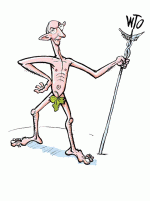What's at stake in Cancún?
At the upcoming Fifth World Trade Organization (WTO) Ministerial Conference in Cancún, to be held September 10-14, 2003, ministers from the 146 WTO member states set out to chart a course for the next few years of WTO negotiations. The contentious issues of agriculture and access to medicines will likely take centre stage and many commentators argue that the very future of the WTO rides on the results of the Cancún Ministerial. At the time of writing, Northern governments, particularly the United States, continue to block changes to the WTO's TRIPs agreement, which would allow poor countries the right to obtain affordable medicines for AIDS and other public health disasters. Other issues on the Cancún agenda include proposed sweeping cuts in industrial goods tariffs and an injection of momentum into the controversial General Agreement on Trade in Services (GATS) negotiations.
The EU will also push for negotiations on four new controversial issues: investment, competition, transparency in government procurement, and trade facilitation -- a.k.a. the Singapore Issues. An EU-approved agreement on each of these issues would go far in providing uninhibited market access to the EU's powerful multinational corporations. A WTO agreement on global investment, for example, will seriously restrict the ability of governments to steer corporate activities towards serving public interest goals.
No less than 68 of the WTO's developing country members explicitly oppose the launch of negotiations on the Singapore Issues at Cancún.[1] But the Commission has a powerful ace up its sleeve: exploiting third world desperation over Europe's dumping of its subsidised agricultural products on world markets. The EU's negotiating ploy is likely to be that, if developing countries give the nod on the Singapore Issues, the EU will make minimal reforms to its Common Agricultural Policy (CAP), which has allowed artificially cheap EU produce to drive third world farmers out of business and off their land. Many developing countries may well feel that they have no choice but to go along with this, even though the reforms fall far short of remedying the problems caused by the CAP.
Global civil society largely agrees that the expansion of the WTO's powers, as proposed by the EU with its promotion of the 'Singapore Issues', runs counter to the interests of people and the environment. But given the EU's dirty play, voices for justice will have to rise loud, clear, and persistent to be heard by the deaf ears of the WTO's powerbrokers.
Recommended reading:
The Institute for Agriculture and Trade Policy (IATP) has published a pamphlet that introduces major issues on the agenda at the Cancún WTO ministerial. Celebrating Fair Trade in Cancún, IATP, September 2003.
Notes:
- Singapore Issues in the WTO: What do developing countries want, CAFOD, August 2003.
This figure of 68 developing country WTO members constitutes well over half the WTO's developing country membership. This is significant because, theoretically, the Singapore Issues will only be launched if there is "explicit consensus" in favour of this (at Cancún) amongst all 146 WTO members. Back
